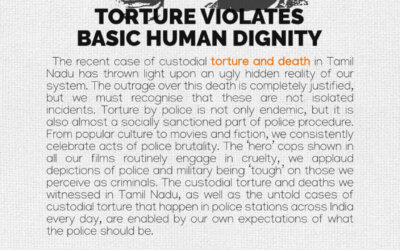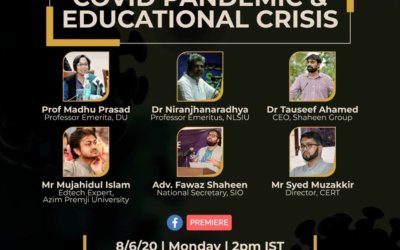 (This is the Inaugural speech delivered at Workshop on National Education Agenda
(This is the Inaugural speech delivered at Workshop on National Education Agenda
at Delhi University, New Delhi on 16 September by Secretary General, SIO of India)
SIO is a revolutionary student movement. Why I say its a revolutionary movement? Because it has its own mission. The main difference between SIO and other Student organisations (both religious and political) is that it has its own mission, aim, purpose (maqsad), policies, vision and concepts about education, knowledge and students life.
The mission of SIO is; “To prepare the students and youth for the reconstruction of society in the light of Divine Guidance.”
The two main working areas of SIO are: Students’ Life and Education & Knowledge.
Now, let’s discuss about the first working area i.e. Students’ life.
1) STUDENTS’ LIFE:
A) Ideological Base:
For any organisation/body/movement some ideological base is required. Islam (Islamic in its name itself) is the ideology of SIO. Here is one question – Is it communal? The answer is that SIO is against communalism and related activities. Then next doubt – whenever you are joined with an ideology/religion shall it be of/for/by those who are following same ideology/religion? If democracy is a system of the people, for the people and by the people; is SIO of the Muslims, for the Muslims and by the Muslims?
It is not like that.
I can tell you very clearly that both ideologically and practically SIO is just opposite of this. I already told you that Islam is the ideology of SIO. You know that the revealed book – Qur’an – is the first source of knowledge for Mankind. Qur’an is telling about itself that this book is for the whole mankind and not only for Muslims (Hudal linnas). I want to quote Tariq Ramadan: ANNAS – is a terminology
which is plural and public includes whole mankind irrespective of caste, creed, colour, religion, region,
language etc. (The manifesto for a new “WE”). Rasool (The prophet) is the teacher of Qur’an – the Qur’an is telling about him that He is mercy (Rahmath) for the whole mankind and I repeat not only for Muslims. Ka’ba: the point where Muslims face towards when they perform salat –
Qur’an tells us that Ka’ba is for the whole mankind and as I told you not only for Muslims (wudhia linnas). The reason of existence of Muslim Ummat as Quran says: is for all mankind and not for itself (Ukhrijath linnas). Addressees of the Qur’an are not only Muslims but the whole mankind (Ya ayyuhan nas).
In activities: SIO works for students, all students. If you look at the various activities – meetings, seminars, workshops, welfare activities, protests, march, rallies etc you can see the addressees, beneficiaries and even cadres are not only Muslim students, but all students irrespective of caste, creed, colour, religion, region, language etc.
So, SIO is working for the creation of a non-communal society. Not for clash of civilisation, but for dialogue amongst the civilisation – UNESCO Report 2009 mentioned SIO as one of the best practices of youth interfaith dialogue in the world. If you look at the SIO’s various campaigns you can understand this type of ideological campaigns throughout its history. Some of the campaigns are: Call to
peace (1989), Hindu – Muslim dialogue (1993), Save India (1994), Hinduism – Marxism – Islam dialogue (1995), Anti Fascism Day (1996), Social Justice Day (1997), Terrorism:
Reality and Solutions (2001) etc.
When the SIO delegation visited Jamia Millia Islamia for congratulating the Vice-Chancellor at the time when Jamia got its minority status, he asked: are you working only for Muslim students? We told him that we are just like JMI. JMI is an institution and we are an organisation – this is the only difference. When someone looks your name, you are an Islamic institution like Jamia, Milliya, Islamia but you are not only for Muslim students but for all. We are also ‘Islamic’ in that sense but not communal, not only for Muslim students but for all of them.
B) Morality:
Another important difference between SIO and other student’s organisations is that SIO focuses on moral development of the student’s community especially its cadres. SIO is trying to develop moral values and ethical outlooks amongst the students.
For example: Ragging – is the most abominable and let me say dangerous practice in the Indian campuses. It is the outcome of a criminal and distorted mindset. SIO tried to eradicate this evil from the Indian campuses. As a leader of SIO, I can assure you that no SIO cadres are involved in any ragging case for the last 30 years of its history in Indian campuses from Punjab to Kerala and Gujarat to Manipur.
But I know SIO workers were arrested by police and even tasted the life in Jail for conducting Protests, Dharna, for handling and solving student’s problems and educational issues.
So, SIO tried to develop courage, self confidence and ethical and moral values in the student community through its various programmes.
C) Spirituality:
Another important difference between SIO and other student’s organisations is that SIO is trying to develop spiritual content in the life of a student especially its cadres.
The term ‘spirituality’ is misinterpreted in the society.
What is Spirituality?
The best example of spirituality or the role model of spirituality is the Prophet. When we look into the life of Prophet, you can understand that his entire life is filled with spirituality. It is not merely related with the unseen world, but with the real life. The true spirituality will influence
the entire life of an individual. We can see the best example of spirituality from prophet life at the time of Isra’ and Mi’araj. Prophet visited heavens. When he visited what he had done? Allama Iqbal discussed the thing in detail. What prophet has done? Prophet did not remain there with the superpower of spirituality, in the company of sacred angels without any semblance of sin, in heavens. Instead, he came to the earth and worked for the welfare and development of whole mankind.
Therefore, if you are a cadre of SIO, you can feel the entire activity of the movement as the spiritual exercise/spiritual experience/spiritual reality. Through various programmes and orientations the organisation ensures the spiritual development of a student.
Now we move to the second area i.e. Education and Knowledge.
2) EDUCATION & KNOWLEDGE:
A) Ideological based activism:
SIO has a clear-cut concept about education and knowledge. As an ideological organisation, SIO has a different opinion about Indian educational system, curriculum, methodology, vision etc. SIO is an ideological organisation. Logically, the focal area of activism is students, education and educational institutions. As a Student organisation, SIO has tried and contributed a lot to the betterment of Indian educational system, including policy making, policy implementation and critical evaluation of governmental educational activities. We also have our own
concepts, philosophy, methodology and orientation to education, evaluation of the Indian educational system and possibilities within it as a whole. If you look at the SIO’s various campaigns you can understand this type of ideological campaigns throughout its history. Some of the campaigns are: Turn to the Creator (1994), Campus Interactive Survey (1996), Introduction to Morality (1997), Towards Success (1999), Save Campus –Save India (2000), Protect Studenthood (2001), Lets Come Together (2002), E-ethics Day (2003), Wake up – Reckoning is near (2004), Redefining Education, Regaining Struggle, Renovating Society: SIO Awakening the Nation (2007), Discovering Real Studenthood (2009), Study-Struggle-Service: Students for Social Change (2010), Students: Shaping Present. Envisioning Future (2011) etc
B) Study & Research:
Even though SIO has a different opinion about Indian education it has conducted campaigns, protest if needed and raise student community’s demands before government and educational authorities for handling and solving their problems. SIO has a separate study and research wing especially for developing educational policies and issues in the national youth interest, both at the state and central level called Education Strategy Cell. They are studying and contributing to the positive developments within education system, as well as ensuring students’ participation. SIO studies and submits the educational packages, formulae, suggestions and recommendations to the central and various state governments, universities, educational bodies, educational activists. At national level, SIO’s contribution in Lingdo Commission Report, Central Minority Scholarship, University Reforms, and educational Reforms etc can be boldly mentioned. In states, at university and college levels, SIO has tried to study the educational issues and submitted suggestions and recommendations like Scholarships issue in Gujarat, Question Paper leak issue in Karnataka, question paper issue in Maharashtra, submission of educational package in Kerala etc.
That is why HRD Minister Kapil Sibal told SIO leaders that you are an Islamic/religious organisation, but you are contributing to the educational reforms of this nation.
C) Struggle:
The third part is about our ‘struggle’. We conduct campaigns, protests if needed and raise student community’s demands before government and educational authorities for handling and solving their problems. I want to share with you the latest example related to this. The issue was the uncertainty over the date of UGC NET 2010 December result. UGC has over the time changed its date of announcement of the last year’s NET results. From the month of April came the second week of May and the Second Half of May. And Before announcing the results, UGC declared the last date of fresh applications as 02 May 2011. Its announcements read: “Applications received after the last date (i.e. 02.05.2011) at the test centre will not be accepted”. For countless students across the country, NET is the hope of their career and necessary for their ‘appointment’ as lecturers. Many state universities had issued vacancies; the delay on the part of UGC caused great difficulties for students amounting to injustice. SIO immediately took up the issue and led to its solving to avoid further nuisance to students. And the end result of SIO’s struggle was a victory to Indian student community.
SIO conducted UGC Office March and Protest Dharna andits delegation met Dr. N.A. Kazmi, Secretary, UGC and Dr. Surender Singh, Deputy Secretary (NET), UGC after the UGC office March and protest Dharna on 27th May. SIO submitted a memorandum to the Chairman, UGC and Minister of Human Resource Development (HRD).
University Grants Commission (UGC) has ensured the delegation that the UGC NET December 2010 results will be declared on or before 13 June 2011 and the students qualifying the same but have applied for the forthcoming NET in June 2011 will be refunded the fees. And Alhamdulillah, UGC declared its result on 13th June2011 and you can see one additional paragraph in 2010 December results as 5th number REIMBURSEMENT OF FEE, followed by instructions for the same to those who have qualified the NET in December 2010 (http:// www.ugcnetonline.in/RESULT10D.pdf) This is not the first time that SIO has taken up a student problem and pursued it till it has been solved. SIO will continue in future with its consistent efforts for the betterment of student community across the nation.
This national level workshop will discuss various aspects of Education in India: Its Historical Overview, Policy and Practices, Challenges in Higher Education, Challenges of Secondary and Primary Education, Reservation policies in Education Sector, Minority Education, Financing of Education, and Analysis of the Impact of Communalisation of Education etc. I hope and pray Insha Allah, this workshop on National Education Agenda will prove beneficial for all the three types of activities i.e. ideological based activism, study & research and struggle.




0 Comments